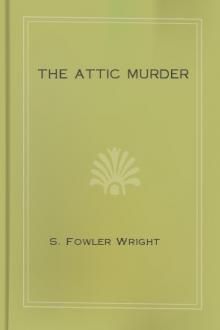The Attic Murder - S. Fowler Wright (ebook reader computer TXT) 📗

- Author: S. Fowler Wright
- Performer: -
Book online «The Attic Murder - S. Fowler Wright (ebook reader computer TXT) 📗». Author S. Fowler Wright
He did fire twice, but the shots did no damage, except to the substantial furniture into which they sank, and before there was time for a further discharge Inspector Combridge had tripped up a man who was stumbling half-blindly toward the door.
Sir William Ingleby looked coolly round a somewhat disordered room, as the handcuffed man was removed by the constables who had rushed in at the astonishing sound of shots in the peaceful office of the Assistant-commissioner. He said: “Mr. Jellipot, I have a double reason for which to thank you. You have saved us from a most undignified possibility, and have also been opportune in supplying us with an unimpeachable reason for arresting a man of whose guilt I was less than sure.”
Mr. Jellipot could not dispute the justice of the praise which he received. No man, however blameless on other grounds, can expect to retain his liberty if he discharge revolver-shots in the office of an Assistant-Commissioner of the Metropolitan Police.
He said: “It seemed foolish to me, but I am afraid that the sudden sight of my young companions may have caused him to lose his head.”
The remark directed attention upon those who had been reported to be in a very different and more perilous situation, and Mr. Jellipot went on to explain their presence.
“It appears,” he said, “that there was a little misunderstanding — a very natural misunderstanding — concerning the extent of Miss Garten’s previous acquaintance with the art of flying. She had, in fact, taken a course of instruction in Germany, at a time when aviation was very popular among the youth of that country, and before she commenced the associations which she has since, I feel sure, regretted.
“An incident in which she refused, for quite different reasons, to take the risks of the air, was interpreted in a way which led it to be supposed that she was as inexperienced in as she was averse from that somewhat hazardous method of transportation, and her subsequent denials, which do not appear to have been accompanied by the explanations she might have given, had there been a more real intimacy subsisting between herself and her late companions, seem to have been misapprehended and disbelieved.
“When the machine was very kindly left in her charge, she flew it back to the Croydon station, where she knew that a safe landing would be easy to find.”
Sir William looked at her with the respect which those who have not yet joined in the conquest of upper air are inclined to feel for their more venturesome fellow-citizens. “It was,” he said, “a very brave thing to do.”
“There wasn’t much in that.,” Miss Garten answered. “At least there wouldn’t have been if they hadn’t been so stingy in filling up. The real fright I got was when I thought Harold was going to kick against going, and I daren’t give him any idea that they were setting us free in the way I had hoped they would.”
Sir William said: “Well, I hope your troubles are over now.” He spoke to Francis and Miss Garten equally, or so Mr. Jellipot took it to be. To the astute lawyer the opportunity was too good to miss. He reminded the Assistant-Commissioner that his client’s appeal was still a fence to be overcome.
“Oh,” Sir William said, in the good-humoured satisfaction he felt from the knowledge that the Rabone case was likely to end in a way that would redound to his own credit, and that of the efficient force it was his pleasure to rule, “I don’t think he need trouble overmuch about that. There are ways — and ways — - “
And Mr. Jellipot, for all his caution, was inclined to agree.





Comments (0)